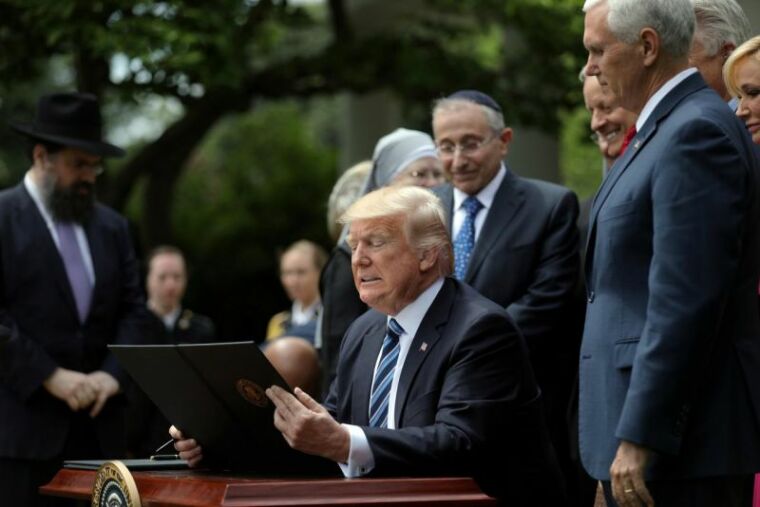FFRF releases ad attacking Trump's religious liberty order

The Freedom From Religion Foundation (FFRF), the largest association of atheists and agnostics in the U.S., has released a full-page advertisement in the New York Times decrying President Donald Trump's executive order on religious liberty.
The advertisement, which appeared on the newspaper on Thursday, accuses the president of waging a "great big war on the separation of church and state" and carrying out an "all-out assault on the First Amendment."
It features four large stockings labeled "Religious vouchers," "Cabinet Zealots," "Church Politicking" and "Stacked Judiciary" and smaller ones that are labeled "Women's rights," "LGBT," "Planned Parenthood," "Muslim Immigrants" and "Civil Liberties." The larger stockings are filled with money, crosses and gifts, while the smaller ones are filled with a lump of coal each.
FFRF Co-Founder Annie Laurie Gaylor stated that the advertisement is partly aimed at Trump's "Merry Christmas" proclamations.
"There's no 'war on Christmas,'" she said, as reported by The Global Dispatch. "That's Fox News' phony construct. But there most definitely is a concerted war on the First Amendment's cherished principle of separation between government and religion," she added.
During the campaign period, Trump had vowed that he will encourage Americans to say "Merry Christmas" again and not be silenced.
FFRF Co-President Dan Barker accused Trump of inflicting "great harm" on the separation of church and state, citing the executive order on religious freedom signed by the president in May.
The secularist group had filed a lawsuit challenging the executive order, which was designed to "protect and vigorously promote religious liberty" and "alleviate the burden" of the Johnson Amendment.
The FFRF had been one of the biggest advocates of the amendment, which prevents churches and other nonprofits from engaging in political campaigning.
However, the organization filed a motion to dismiss the lawsuit earlier this month, claiming that it did so because the Trump administration had stated in court filings that the order does not exempt religious organizations from the restrictions against participating in political campaign activities.
The Justice Department explained that the order directs the government not to take "adverse actions against religious organizations that it would not take against other organizations in the enforcement of these restrictions."
The Trump administration maintained that the FFRF simply misunderstood the order, but the secularist group argued that the Justice Department's explanation shows that the president's promises to abolish the Johnson Amendment had not proven to be true.
Other secularist organizations, such as the American Civil Liberties Union (ACLU), have refrained from challenging Trump's order in court because they did not think that the rule followed through on the president's promise to "destroy" the amendment.
 Christians don't have to affirm transgenderism, but they can’t express that view at work: tribunal
Christians don't have to affirm transgenderism, but they can’t express that view at work: tribunal Archaeology discovery: Medieval Christian prayer beads found on Holy Island
Archaeology discovery: Medieval Christian prayer beads found on Holy Island Presbyterian Church in America votes to leave National Association of Evangelicals
Presbyterian Church in America votes to leave National Association of Evangelicals Over 50 killed in 'vile and satanic' attack at Nigerian church on Pentecost Sunday
Over 50 killed in 'vile and satanic' attack at Nigerian church on Pentecost Sunday Ukrainian Orthodox Church severs ties with Moscow over Patriarch Kirill's support for Putin's war
Ukrainian Orthodox Church severs ties with Moscow over Patriarch Kirill's support for Putin's war Islamic State kills 20 Nigerian Christians as revenge for US airstrike
Islamic State kills 20 Nigerian Christians as revenge for US airstrike Man who served 33 years in prison for murder leads inmates to Christ
Man who served 33 years in prison for murder leads inmates to Christ


 Nigerian student beaten to death, body burned over ‘blasphemous’ WhatsApp message
Nigerian student beaten to death, body burned over ‘blasphemous’ WhatsApp message 'A new low': World reacts after Hong Kong arrests 90-year-old Cardinal Joseph Zen
'A new low': World reacts after Hong Kong arrests 90-year-old Cardinal Joseph Zen Iran sentences Christian man to 10 years in prison for hosting house church worship gathering
Iran sentences Christian man to 10 years in prison for hosting house church worship gathering French Guyana: Pastor shot dead, church set on fire after meeting delegation of Evangelicals
French Guyana: Pastor shot dead, church set on fire after meeting delegation of Evangelicals ‘Talking Jesus’ report finds only 6% of UK adults identify as practicing Christians
‘Talking Jesus’ report finds only 6% of UK adults identify as practicing Christians Mission Eurasia ministry center blown up in Ukraine, hundreds of Bibles destroyed: 'God will provide'
Mission Eurasia ministry center blown up in Ukraine, hundreds of Bibles destroyed: 'God will provide' Church holds service for first time after ISIS desecrated it 8 years ago
Church holds service for first time after ISIS desecrated it 8 years ago Burger King apologizes for 'offensive campaign' using Jesus' words at the Last Supper
Burger King apologizes for 'offensive campaign' using Jesus' words at the Last Supper Uganda: Muslims abduct teacher, burn him inside mosque for praying in Christ’s name
Uganda: Muslims abduct teacher, burn him inside mosque for praying in Christ’s name